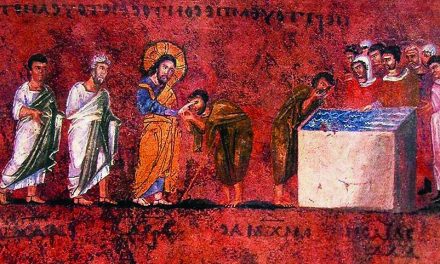Matthew A. Shadle is Associate Professor of Moral Theology at Loras College in Dubuque, Iowa.
On Monday, the Supreme Court, by a 5-3 vote, overturned three of the four major provisions of Arizona’s 2010 immigration law (“SB 1070”). These three provisions, according to the court’s majority opinion, either went beyond federal immigration policy or interfered with the federal government’s discretionary enforcement of those policies. The court did, however, uphold the section of the law which requires state and local police officers to contact Immigration and Customs Enforcement if there is a reasonable suspicion that a person stopped for another offense is in the country illegally, but interpreted this provision narrowly, suggesting that holding a person for an unreasonable amount of time during an immigration check or detaining someone merely to check their immigration status could successfully be challenged in court. The court also left open the possibility that, once in force, the law could be challenged for racial profiling.
Later that day the United States Conference of Catholic Bishops put out a news release praising the decision, yet raising concerns about the provision left in place. The bishops had earlier filed an amicus curiae brief for the case. The bishops’ opposition to Arizona’s immigration law, and other similar state laws, is consistent with their long-standing support for comprehensive immigration reform. The bishops have outlined their teaching on immigration in their pastoral letter Strangers No Longer: Together on the Journey of Hope, co-written with the Catholic bishops of Mexico, and have lobbied Congress for years on the issue.
Although the bishops have been effective advocates for immigration reform, they have not been nearly as effective at convincing their fellow Catholics of the wisdom of this teaching. A Zogby poll in 2009 showed that seventy-eight percent of Catholics believe that the primary cause of illegal immigration is a lack of enforcement, rather than the inadequacy of U.S. immigration policy. Similarly, sixty-four percent of Catholics believed that illegal immigrants should be deported, as opposed to only twenty-three percent who believed there should be some process of legalization. The study also showed that sixty-nine percent of Catholics believe that current legal immigration rates are too high and should be reduced.
Certainly more could be done to publicize the bishops’ teachings, but I believe that the deeper reasons for the lack of reception of Catholic teaching on immigration are illuminated by two core principles of Catholic teaching: the preferential option for the poor and vulnerable and solidarity. Going beyond press releases and bulletin inserts, the church needs to engage in practices that will form its members to more actively embody these principles.
As a result of original sin, we have an innate tendency to achieve otherwise praiseworthy goals at the expense of those least able of standing up for themselves. The preferential option for the poor and vulnerable counteracts this tendency by putting our focus on “the least of these” (Matt. 25:40). Some Catholics critical of the bishops’ position refer to the right of nations to control their borders, which is part of Catholic teaching, to justify more restrictive immigration policies, but this defines the “common good” too narrowly and puts the needs of relatively well-off Americans ahead of those of people who are more vulnerable. As the U.S. bishops write in Strangers No Longer, “While the sovereign state may impose reasonable limits on immigration, the common good is not served when the basic human rights of the individual are violated. In the current condition of the world, in which global poverty and persecution are rampant, the presumption is that persons must migrate in order to support and protect themselves and that nations who are able to receive them should do so whenever possible” (#39). Critics argue that immigrants take jobs from American workers and add strain to social services, yet is it really just to blame the least well-off for our inability to provide adequate jobs and social services to those who need them? Other solutions appear invisible to us because they require the powerful, rather than the weak, to make sacrifices. The church must help make real alternatives visible.
A similar dynamic can be seen in the justifications for Arizona’s law. Arizonans claim that their border with Mexico has become lawless as a result of the intermingling of drug cartels and other criminal groups with illegal immigration, and that draconian immigration laws can combat this. In the process, though, the vast majority of illegal immigrants, who have nothing to do with drug trafficking, are transformed into a mortal threat. A saner policy would be to provide greater opportunities for legal immigration so that law enforcement could focus on real criminals rather than families seeking a better life.
Catholic social teaching also calls on us to embody solidarity. In Sollicitudo Rei Socialis, Pope John Paul II defines solidarity as “a firm and persevering determination to commit oneself to the common good; that is to say to the good of all and of each individual, because we are all really responsible for all” (#38). Solidarity means putting ourselves in the place of the other. Defenders of more restrictive immigration define the “common good” narrowly in terms of the good of American citizens, yet solidarity calls us to expand our horizons to include those beyond our borders. This means coming to understand the struggles faced by those who choose to illegal immigrate. We do have special responsibilities to our fellow citizens, but not at the expense of more basic rights for our fellow human beings. The Arizona law and similar laws also show a lack of solidarity with Hispanics. The idea that Hispanics will “have to endure some inconvenience” that others do not, based solely on their ethnicity, must be challenged.
Because our tendencies to exploit the vulnerable and to look out for “our own” at the expense of others are deep-seated, the Catholic Church must be creative in developing ways to effectively communicate its teaching on immigration. For example, in one of my classes, and more recently in our archdiocese’s diaconate formation program, I divide the room into two spaces, one representing the United States, the other the rest of the world. I assign participants a national origin and background story, and then have them apply for entry to the United States. Some are granted visas and others are not, based on current U.S. policy. Each is also given a “savings account” that diminishes over time, unless they reach the United States. Those who are denied visas or whose savings account runs out before their visa is granted are given the option to enter the U.S. illegally. By the end of the session, every single person is in the space representing the United States, even though only roughly half were granted visas. Without telling anyone what to believe, this simulation helps participants overcome Americans’ fetishization of the law and realize that immigration policy is part of the problem. It also helps them see things from the perspective of immigrants, rather than American citizens.
At the parish level, churches with populations that include large numbers of immigrants should sponsor events in which people of different cultures interact with one another. These can include cultural celebrations of the immigrant group, such as Our Lady of Guadalupe, or celebrations important to the parish or diocese. These events provide people with an opportunity to get to know immigrants as people first.
Although the Supreme Court’s decision in United States v. Arizona was a partial victory, there is much yet to be done. What both supporters and opponents of Arizona’s SB 1070 have failed to realize is that state and local police across the country are already free to check people’s immigration status, and are doing so; the law only made this a requirement for Arizona’s police. Racial profiling of Hispanics is not a hypothetical, it is a reality (also here and here). At the national level, political leaders, including presidential candidate Mitt Romney, have advocated for the “self-deportation” of illegal immigrants, that is, the implementation of policies like those in Arizona and Alabama at the national level. The Catholic bishops must continue to teach and lobby, but they must also do a better job of forming Catholics to “welcome the stranger.”





Once again we have what purports to be an moral evaluation of a political issue turn out to be little more than an uncharitable judgment of those who take a position in opposition to the author’s. There is much to disagree with here.
To be clear it should be noted that the bishops oppose the Arizona law because it would be effective. It won’t eliminate but it will surely reduce the number of illegals who reside in that state, contrary to the bishops’ apparent belief that more is better. The bishops’ position is called a “teaching” which it might well be but it is also surely an opinion, and as I said before, a bit of an uncharitable one at that. (One can see just how uncharitable by reading the comments of Abp. Dolan about the passage of the Arizona law.)
We oppose illegal immigration because of our failure to overcome our innately sinful nature? Really? We define the common good too narrowly? These are not arguments they are insulting assertions and I really think Professor Shadle can do better than attribute our opposition to his position to the fact that he and the bishops have overcome their baser instincts while we wallow in moral decay with “our tendencies to exploit the vulnerable”.
There are valid reasons to oppose illegal immigration and amnesty and those reasons need to be addressed on their own terms and not simply dismissed as the result of original sin. This article addressed none of those reasons. It is not an evaluation of the positions his opponents hold; it is a judgment of the people who hold them.
My post was not primarily intended as an argument intended to convince those who disagree with me on the issue of immigration, but rather a post about how the Catholic Church could better form its own members about its own teachings.
Also that is simply false (“uncharitable” even?) to claim that I simply dismiss the opposing arguments by calling them sinful. I make two substantive points against the opposing view. 1. Restrictionist views on immigration too narrowly focus on the well-being of American citizens at the expense of more fundamental rights of non-Americans; 2. Restrictionist views on immigration unfairly require the most vulnerable stakeholders to make sacrifices, when other solutions could be found that more equitably deal with the vulnerable groups involved, namely immigrants and low-skill American workers.
You might disagree with those points, but those are the points I am making. If my point was to argue against the opposing view, I would have developed them more. But what do you think are the most convincing arguments in favor of a law like Arizona’s?
Matthew: Thank you for your response even though it, not surprisingly, differs from my perspective. Most significantly I disagree that letters from the USCCB on specific immigration proposals represent Church teaching. The application of Church doctrine is prudential. I suspect you will agree that we are not obligated to assent to prudential opinions so unless it is argued that we may dissent from Church teaching these prudential positions do not qualify as such since we may surely disagree with them.
As for my perhaps “uncharitable” claim that you hold your opponents arguments to be sinful let me ask this: if a position is in opposition to Church teaching is it not sinful and isn’t it your argument that those of us who hold opposing views do so in opposition to such teaching? I don’t understand how acting in opposition to Church teaching can be other than sinful. If you insist that restrictionist views violate Church teaching then it seems they are sinful by definition, but if you admit that such views are not sinful it can only be because they don’t violate Church doctrine.
Regarding the Arizona law, a discussion of its anticipated effects might be quite interesting but such a debate is not being held. What I have mostly seen so far from its opponents are insults questioning the morality of those who support it (Abp. Dolan likened them to eugenicists and the KKK). I am quite prepared to be told I am an idiot who doesn’t understand the situation, but – and this is the point I’ve been making – I am not prepared to accept charges that I am immoral (or in opposition to the Church) for holding my particular views.
Sorry I am a little late responding. One of your running concerns is that people should not be accused of being sinners, or assumed to be sinful, because of disagreements over policy. I think that is a valid concern, and I actually raised a very similar point in response to one of Meghan Clark’s posts on the Ryan budget. I can also see how you read that in my original post here.
However, I think we can distinguish between the viewpoint and the person in a strong enough way to avoid the problem that both you and I identify. We can identify a belief as evil, sinful, unjust or whatever you want a call it. But that does not in itself mean that every person who holds that belief is evil or sinful individually. People can come to incorrect conclusions, which in terms of ethics means evil or unjust conclusions, for a variety of reasons. They might approach the issue in good faith, and simply make a mistake in reasoning. Or they might live in a society in which a certain evil practice is so widespread that it would take a certain heroic level of virtue to come to an opposing conclusion. Those are just a couple of ways.
It is easy to think of examples, even in cases of intrinsic evils, so that we are both agreed they are truly ethical conclusions. So for example, in the United States between 70 and 80% of people believe that at least some abortions are justified. Is it reasonable to believe that every single one of them is evil for reaching that conclusion? I personally don’t think so. Maybe an easier case is pre-marital sex. The Catholic Church also considers this an intrinsic evil, yet large majorities of Americans believe that it is acceptable. Are they all evil for reaching this conclusion? Probably not.
This might be more controversial, but I think you can still say that in general there is something sinful about abortion or pre-marital sex being so widely accepted, without saying that every person who accepts them is sinful as an individual. I was making a similar assumption regarding immigration. I think there is something sinful about our current immigration law, and laws like Arizona’s, but I don’t think that every individual (or even most of them) who supports them is sinful.
I do agree with your point that you cannot simply start by calling a certain position sinful without any sort of argumentation. I think that sometimes when we bring theological language to a controversial issue it has that effect, of oversimplifying and escalating the debate without any clear benefit. But I think if used correctly, theological language can add a dimension to our understanding of the issues, as well.
It would be interesting to discuss whether doing something sinful is necessarily a sin but that’s not where our difference lies. Rather, this is: “People can come to incorrect conclusions, which in terms of ethics means evil or unjust conclusions”.
I accept that a good intention alone is insufficient to justify an action even when the act doesn’t involve an intrinsic evil; an action can be immoral if it involves carelessness, indifference, or impetuousness but beyond this I reject the idea that incorrect conclusions are either evil or unjust. They are merely mistakes, regardless of the outcomes.
I think it is not merely theologically incorrect but a tactical error as well to label incorrect conclusions as evil in that it blurs the distinction between actions that truly are evil and those that are simply controversial. I think the unspoken assumptions when the charge is made about someone’s proposal that it is unfair or exploitative is that the person making the proposal knows it is unfair and doesn’t care. Otherwise why not call him stupid instead of immoral?
You have couched your immigration proposals in moral terms implying that those who differ with you are, if not immoral themselves, at a minimum committing immoral acts, but your proposals are nothing more than your opinions on what you think should be done to achieve your goals. They are neither more nor less moral then my opinions, my proposals, and my goals.
We can act immorally in any situation but that does not make all our choices moral ones. If I think putting up an impenetrable barrier along the Mexican border is a necessary and appropriate solution, then even if I am completely wrong I have not acted immorally. Immigration is a prudential issue and within the general guidelines the Church has specified all proposals are equally moral even if they are not equally correct.